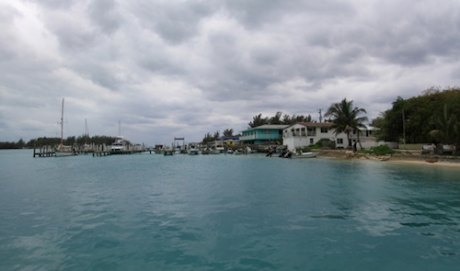A Beacon of Hope for the Boatyard Blues

Of course, as soon as I cut a new hatch in the deck right above the old engine, it began to rain. And it rained. It continued to rain for most of the week so I had to rig a tarp over the hatch and carry on. As soon as I got the old engine out (no easy task, as it turned out), I began to realize that there was more to this job than I'd anticipated. The new Yanmar differed from the old motor in just about every conceivable way. First I had to build a new engine bed and carefully align the prop shaft. The cooling system required a 3/4” raw water intake instead of the 5/8” I already had. The exhaust system required 3” piping and muffler instead of the 2” stuff the old motor used. And, of course, most of the parts had to be ordered, so that my time in the boatyard (at the then staggering rate of $25 per day) increased with no end in sight.
All this time I was living aboard the schooner up in its jack stands. No air conditioning. Lots of mosquitoes. Grease and mud all over the decks, the cabin interior and me. Having electricity, I could run the refrigerator and cook meals on board, which I did as much as possible to keep costs down. West palm Beach is well known for some very glamorous real estate, but, as you might expect, the boat yard was not in the most upscale neighborhood. There was, however, a chain supermarket just a two-block stroll away. Whenever I went out for groceries (and, of course, beer) I encountered a legion of homeless winos, hookers and panhandlers lounging in the doorways of abandoned buildings.
As my tenure in the yard drew on and my funds ran lower, I began to wonder how many of these unfortunate souls might have started out like me – innocent boaters who just stopped into the yard for a quick haul-out and repair only to drown in a sea of unforeseen expenses.
Depressing as my situation was, there were a couple of things that made me temporarily forget my troubles and grin a bit. The boat yard foreman whose name I've forgotten had a very intelligent little schnauzer named Rachel who was his faithful assistant. Whenever a boat was being warped into the slipway, Rachel would tail onto whichever line her master was pulling on and take up the slack. And whenever the foreman would pick a boat up in the travel lift (a large tractor with heavy belts for lifting boats out of the water and parking them in the yard), Rachel would position herself right under the center and serve as lookout. If a pedestrian or vehicle approached the slowly moving travel lift, Rachel would dart out and bark them away ferociously.
But the best thing of all was this. Every day at 4:45 p.m., the foreman would cruise slowly through the boat yard in his VW beetle, tooting his horn to let folks know that he was about to lock the gate for the night. Anyone with a vehicle that needed to be brought in or taken out had fifteen minutes to move it. He didn’t just toot the horn randomly, however. Not at all! Every evening it was exactly the same: “dah-dah-dit-dit, dah-dit-dit-dit, dha-dit-dit-dit.” Ham radio operators and boy scouts will recognize that as Morse code for “ZBB.” But to sailors who cruised southern waters before the age of Loran and G.P.S. it means “BIMINI.”
Back in the ‘60s and ‘70s, when you wanted to find your way to or from the Bahamas, you used a radio direction finder (or R.D.F.) which was nothing more than a portable transistor radio with a directional antenna mounted on top. Various transmitters along the coast and in the islands would broadcast continuous code letters on designated frequencies so that mariners could rotate their antennae and obtain a bearing or “line of position. Wherever two or more of these lines intersected was your position (more or less, depending on how well you could hold things steady on a rolling sea!). The tower at Bimini has by far the strongest signal around.
Thus the cheerful sound of “ZBB” from that beetle’s horn was a beacon of hope, suggesting to some of us yard-weary sailors that “this too will pass” and we’ll one day be sailing again for beautiful distant shores.
When my painful ordeal was finally over and my schooner back in her element with her frisky new engine, I handed a check to the yard foreman and thanked him for everything. “And by the way,” I said, “Thanks for tooting BIMINI every afternoon!” He laughed and told me that he’d been doing that for years and I was the first person ever to mention it to him.



